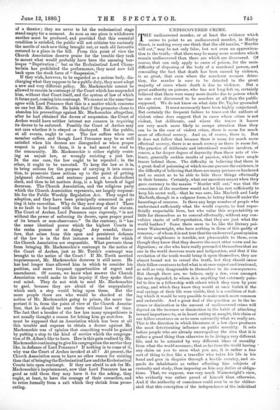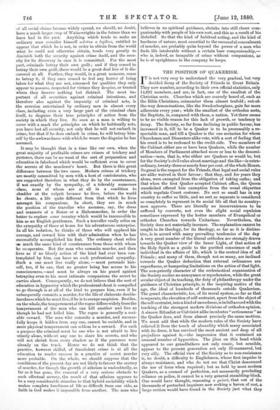UNDISCOVERED CRIME.
THE undiscovered murder, or at least the evidence which seems to point to an undiscovered murder, in Harley Street, is making every one think that the old maxim, "Murder will out," may be not only false, but not even an approxima- tion to the truth,—that there may be many more murders which remain undiscovered than there are which are discovered. Of course, that can only apply to cases of poison, for the mere difficulty of disposing of the body of a murdered person, and concealing the fact that death has been caused by violence, is so great, that even where the murderer escapes detec- tion, the murder is sure to be detected in the great majority of cases where death is due to violence. But a great authority on poisons, who has not long left us, certainly believed that there were many more deaths due to poison which no one ever discovered to be murders at all than the public supposed. We do not know on what data Dr. Taylor grounded this opinion. It must necessarily have been highly conjectural. But certainly the frequent failure to trace out the authors of violent crime does suggest that in cases where crime is not violent, but deliberate, and where the traces it leaves are very much more likely to escape attention than they can be in the case of violeut crime, there is room for much more of effectual secrecy. And so, of course, there is. But it does not follow that because there is room for much more effectual secrecy, there is as much secrecy as there is room for. The practice of deliberate and intentional murder involves, of course, a far deeper degree of depravity than those acts of vio- lence, generally sudden results of passion, which leave ample traces behind them. The difficulty in believing that there is a great deal of poisoning of which no one guesses the existence, is the difficulty of believing that there are many persons so hardened and so secret as to be able to bide these things effectually in their breasts. Certainly, what our ancestors meant when they gave currency to the maxim "Murder will out," was that the conscience of the murderer would not let him rest sufficiently to keep his secret well,—that he was sure, like Macbeth and Lady Macbeth, though in a vulgarer form, to betray himself under the hauntings of remorse. Is there any large number of people who understand sufficiently what the world expects, to lead super- ficially respectable lives, but who value this respectability so little for themselves as to conceal effectually, without any con- vulsive starts of self-reprobation, that they are just what the world loathes ? Some there seem to be, like the literary poi- soner Wainewright, who have nothing in them of this gadfly of remorse,— of whom it is not true that the undeserved good opinion of their neighbours is terrible, not pleasurable to them, even though they know that they deserve the most utter scorn and in- dignation; or else who have really persuaded themselves that no one in the world deserves scorn and indignation, and that if the revelation of the truth would bring it upon themselves, they are almost bound not to reveal the truth, lest they should cause their fellow-creatures to feel what is at once unjust and irrational, as well as very disagreeable to themselves in its consequences. But though there are, we believe, only a few, even amongst. the most degraded, to whom it is anything but extremely pain- ful to live in a fellowship with others which they earn by pure acting, and which they know they would at once forfeit if the
real springs of their life were visible, that is a condition of feel- ing which it would be very possible to make much more common and endurable. And a great deal of the question as to the in- crease or diminution in the amount of undiscovered crime will depend on the increase or diminution in the habit of attaching inward importance to, or in heart setting at naught, this claim of our fellow-creatures on us to seem outwardly what we really are. This is the direction in which literature of a low class produces the most deteriorating influence on public morality. It sets before people who are already unscrupulous the idea that it is rather a grand thing than otherwise to be living a very different life, and to be actuated by very different ideas of morality from what the world assumes ; that so far from the world having • any claim on you to seem what you are, it is rather a fine sort of thing to live like a traveller who takes his life in his hand and goes in disguise through a hostile country, and re- gards its inhabitants as rather affording him subjects of curiosity and study, than imposing on him any duties or obliga- tions. That, we suppose, was very much Wainewright's view, who evidently was rather proud of himself than otherwise. And if the authority of conscience could ever be so far obliter- ated that this conception of the independence of the individual
of all social claims became widely spread, we should, no doubt, have a much larger crop of Wainewrights in the future than we have had in the past. Anything which tends to make an ordinary man consider himself sautus a legibus, entitled to appear that which he is not, in order to obtain from the world what he could not otherwise obtain, tends very greatly to diminish both the security against crime itself, and the secu- rity for its discovery in case it is committed. For the most part, criminals betray their own guilt ; and if they ceased to betray their own guilt, there would be a great deal less of it dis- covered at all. Farther, they would, in a great measure, cease to betray it, if they once ceased to feel any horror of being taken for what they are not, esteemed for qualities they only appear to possess, respected for virtues they despise, or trusted where they deserve nothing but distrust. The most im- portant of all securities against criminal intentions, and therefore also against the impunity of criminal acts, is the aversion entertained by ordinary men in almost every class, including even a very large part of the criminal class itself, to disguise their true principles of action from the society in which they live. So soon as a man is willing to cover with a mask the principles on which he habitually acts, you have lost all security, not only that he will not embark in crime, but that if he does embark in crime, he will betray him- self by the awkwardness with which he wears the disguise he has assumed.
It may be thought that in a time like our own, when the great majority of profitable crimes are crimes of trickery and pretence, there can be no want of the sort of preparation and education in falsehood which would be sufficient even to cover the secrets of the murderer's heart. But there is this great difference between the two cases. Modern crimes of trickery are mostly committed by men with a host of confederates, who are supported therefore in what they do by the countenance, if not exactly by the sympathy, of a tolerably numerous class, none of whom are at all in a condition to shudder at the culprit because he lives, before the world he cheats, a life quite different from that which he lives amongst his companions. In short, they are in much the position of the traveller who assumes, say, the dress and manners of a Bonze or a Mahommedan, in order the better to explore some country which would be inaccessible to him as an English gentleman. Such a traveller really relies on the sympathy of those at home for his adventurous enterprise. In all his isolation, he thinks of those who will applaud his courage, and reward him with their admiration when he has successfully accomplished his feat. The ordinary cheat relies ao. much the same kind of countenance from those with whom he co-operates. But the man who commits murder, and then lives as if no bloody action of the kind had ever been con- templated by him, can have no such professional sympathy. Such a one must live really alone, — must persuade him- self, too, if he can, that no greater being has access to his coruiciousness,—and must be always on his guard against betraying even to his most intimate companions the secret he carries about. Consequently, we do not believe that the sort of education in hypocrisy which the professional cheat is compelled to go through is at all of the kind to prepare him, even if he subsequently commits a murder, for the life of elaborate double- facedness which he must live, if he is to escape suspicion. Besides, on the whole, the temperament of the rogue differs widely from the temperament of the man who can kill another and live as though he had not killed him. The rogue is generally a soci- able coward. The man who commits a murder, and success- fully keeps it hidden from any one, cannot be sociable, and in mere physical temperament can seldom be a coward. For such a purpose the criminal must be one who is not afraid to live utterly alone, without any one to share his secrets, and who will not shrink from every shadow as if the pursuers were already on the track. Hence we do not think that the practice, however skilful, of fraudulent crime is at all the education to render success in a practice of secret murder more probable. On the whole, we should suppose that the conditions of the present day are not likely to favour the secrecy of murder, for though the growth of atheism is undoubtedly, so far as it has gone, the removal of a very serious obstacle to such effectual secrecy, the result of that atheism appears to be a very considerable stimulus to that. hybrid sociability which makes complete loneliness of life as difficult from one side, as faith in God makes it impossible from another. The man who believes in no spiritual guidance, shrinks into still closer com- panionship with people of his own sort, and this as a result of his disbelief. So that the kind of habitual acting, and the kind of hardness of nature, most essential to the successful concealment of murder, are probably quite beyond the power of a man who finds life intolerable without a certain base companionship,— who is, indeed, as incapable of crime without companions, as he is of uprightness in the company he keeps.



































 Previous page
Previous page